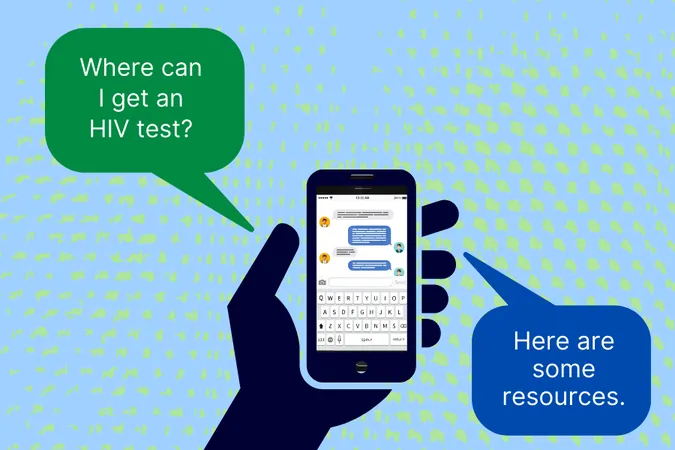
Groundbreaking Study Reveals the Potential of AI Chatbots in HIV Prevention Efforts!
2024-10-25
Author: Wei Ling
Groundbreaking Study Reveals the Potential of AI Chatbots in HIV Prevention Efforts!
In a pioneering study conducted by the California HIV/AIDS Policy Research Centers (CHPRC) in collaboration with the UC Berkeley School of Public Health, researchers have uncovered insightful findings about the effectiveness of artificial intelligence (AI) chatbots in the crucial area of HIV prevention.
Under the direction of Marisa Fujimoto, this research, titled Evaluating AI Chatbots for HIV Prevention: An Assessment of Response Quality and User Tailoring, evaluates the capacity of AI-driven chatbots to provide accurate, engaging, and personalized health information specifically targeting populations affected by HIV and community-based organizations.
As the healthcare sector increasingly embraces digital solutions, this research offers vital insights into how AI technology can be harnessed to enhance HIV prevention efforts—especially in communities that may face obstacles to accessing traditional healthcare. The study not only evaluates the technical prowess of these chatbots but also scrutinizes their ability to meet individual needs, shedding light on their response quality and customization in the public health arena.
Key Findings:
1. High Accuracy, but Mixed Clarity: AI chatbots demonstrated the ability to deliver precise HIV prevention information covering diverse topics, including pre-exposure prophylaxis (PrEP). However, some of the chatbot responses were found to have an inconsistent flow, sometimes lacking clear conclusions or failing to adhere to the latest practices in using non-stigmatizing HIV terminology.
2. Potential for Personalized Engagement: While chatbots could simplify responses upon request, they were often unable to tailor their communication to specific demographics, such as transgender users or individuals in particular geographic locations.
3. Integration Opportunities with Public Health Services: When responses are carefully reviewed and tailored by healthcare professionals, AI chatbots hold promise as effective tools for community organizations. They could significantly improve service efficiency and enhance the quality of health education materials.
“New and innovative ways to enhance HIV care and prevention efforts are needed, especially to reach younger, tech-savvy groups who may turn to digital solutions for health information,” stated Fujimoto. “Our findings leave us cautiously optimistic about utilizing AI chatbots for HIV prevention among individuals from HIV-affected communities, community organizations, and health providers. These chatbots can deliver reasonably accurate information with minimal access barriers and could work best when supported by professional health advice for optimal information dissemination and service referrals.”
Despite the encouraging results, the study prompts essential discussions on how to make sure AI chatbots offer inclusive guidance catering to the unique needs of disproportionately affected communities, particularly those in pursuit of gender-affirming care.
This groundbreaking research was funded by the California HIV/AIDS Research Program through the University of California Office of the President and involved cooperation from notable researchers including Lauren Hunter, Sandra McCoy from UC Berkeley School of Public Health, along with Simon Outram and Laura Packel from UCSF.
As we move forward, the integration of AI technology in public health could revolutionize prevention strategies, offering targeted assistance to communities that need it most. The future of HIV prevention may very well lie in the palms of our hands!




 Brasil (PT)
Brasil (PT)
 Canada (EN)
Canada (EN)
 Chile (ES)
Chile (ES)
 España (ES)
España (ES)
 France (FR)
France (FR)
 Hong Kong (EN)
Hong Kong (EN)
 Italia (IT)
Italia (IT)
 日本 (JA)
日本 (JA)
 Magyarország (HU)
Magyarország (HU)
 Norge (NO)
Norge (NO)
 Polska (PL)
Polska (PL)
 Schweiz (DE)
Schweiz (DE)
 Singapore (EN)
Singapore (EN)
 Sverige (SV)
Sverige (SV)
 Suomi (FI)
Suomi (FI)
 Türkiye (TR)
Türkiye (TR)